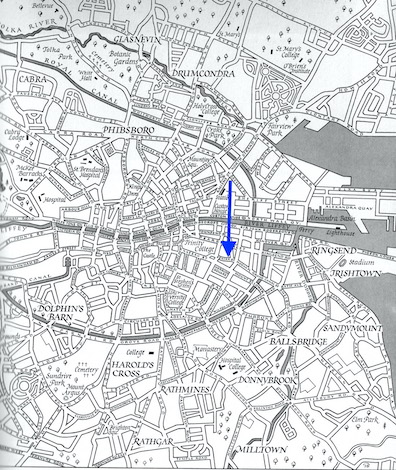In Calypso Bloom recalls running to fetch the
midwife from her home in "Denzille street," near the maternity
hospital on Holles Street. Denzille Street (now Fenian Street)
and nearby "Denzille lane," encountered in
Oxen of the Sun, also evoke the militant Irish
nationalism of the Phoenix Park murders in 1882, connections
brought near the surface of the book's consciousness by the
typically Joycean device of a strange coincidence.
Mary Thornton, the actual
Joyce family midwife whom Joyce imported into his novel,
lived at 19A Denzille Street, as Gifford and Igoe note. But in
a personal communication Vincent Altman O'Connor observes that
this was also the address of James
Carey, the Fenian leader who turned queen's evidence
during the investigation of the murders and fled Ireland under
state protection in 1883, only to be assassinated by an Irish
nationalist on a ship off the South African coast. There is a
perfectly ordinary explanation for Thornton and Carey living
at the same address: he likely was her landlord. Assuming,
that is, that she lived in Denzille Street before the
government took him into protective custody and shipped him
out of the country. If she moved in later than June 1893, then
she could have rented from his heirs. Carey had followed in
the footsteps of his bricklayer father and become a successful
builder and landlord.
There is also a simple explanation for Bloom's knowledge of
the man. Regardless of whether Mary Thornton knew Carey in
person or merely heard about him from neighbors in the
aftermath of his sensational departure, she may well have
shared some of the details with Bloom. Whatever the source of
his knowledge, Bloom has been turning the lesson of Carey's
life over in his mind for a long time, admiring his
nationalism, abhorring his criminal violence, envying his
courage, deploring his betrayal. Eumaeus records this
ever-shifting, parallactic
ambivalence: "turning queen's evidence—or king's now—like
Denis or Peter Carey, an idea he utterly repudiated. Quite
apart from that he disliked those careers of wrongdoing and
crime on principle. Yet, though such criminal
propensities had never been an inmate of his bosom in any
shape or form, he certainly did feel and no denying it (while
inwardly remaining what he was), a certain kind of
admiration for a man who had actually brandished a knife, cold
steel, with the courage of his political convictions."
Joyce scholarship has not paid much attention to the
Denzille-Invincibles nexus, but Dublin has: Denzille Street
became Fenian Street in 1924,
shortly after independence and the civil war of 1922-23.

